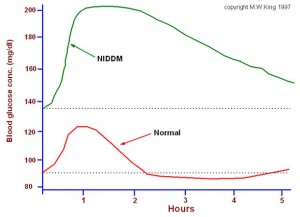What is the normal range of blood glucose?

The normal range of blood glucose depends on many things including weight, age, and other small things. The glucose in the body’s main forms of energy and is really just sugar in the blood stream. If the glucose becomes too high it can damage the person’s body and even kill them. The normal range of blood glucose in an adult is 180m/dl after meals. If the body has a constant or uneven change in the blood glucose levels it may be a sign of diabetes.
Hypoglycemia is where the body has a two low an amount of blood sugar. This happens usually when someone does not eat properly and needs to consume more energy. The symptoms of hypoglycemia are shaking, confusion, dizziness, and fainting if levels become too low. This can be easily reversed with a simple dose of sugar (by eating) or insulin. On the other hand hyperglycemia is there is a high of blood glucose. This presence of hyperglycemia in the body generally means that the body is not producing the amount of insulin needed to convert the sugar into energy. This is usually called diabetes and can be very serious. (Your doctor must take readings before diagnosing you with the disease) The damage that this can do includes heart and kidney disease, and eye sight loss. Both of these can be treated but will change your life forever, for better or worse. Watching what you eat and by knowing your prescribed normal range of blood glucose levels you can watch for these.
Managing a normal range of blood glucose is a fairly easy responsibility. For those with only small mild cases of hyperglycemia can easily manage a normal range of blood glucose with proper exercise and a proper diet. Those who have a more serious case of diabetes much constantly watch what they eat and their blood glucose levels with a meter. Plus they may have to use insulin that they inject into their blood stream to help with the blood glucose level.

